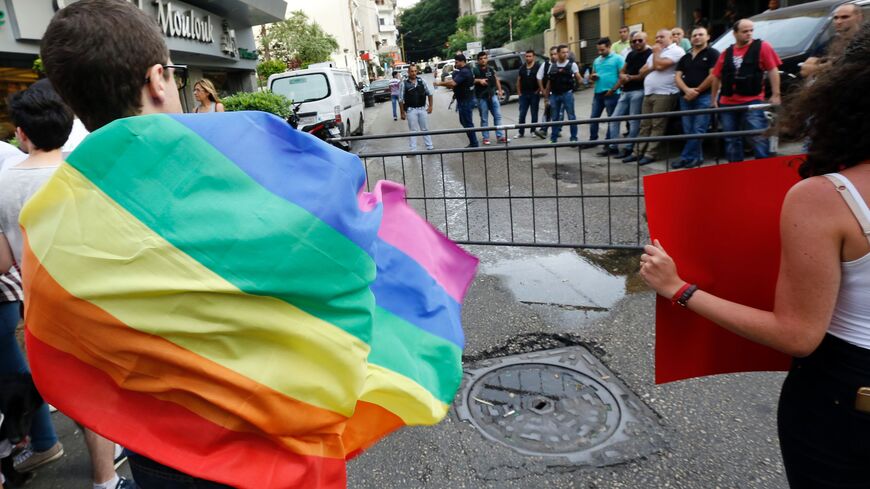BEIRUT — Lebanon's LGBTQ community is no longer safe online, as its members have become a target of both security officers and private individuals seeking to exploit them.
In a report published by Human Rights Watch (HRW) last week, the human rights organization documented extensive cases of digital targeting of the LGBTQ community through interviews with 90 people in Lebanon, Egypt, Jordan, Iraq and Tunisia.
Rasha Younes, the senior LGBTQ rights researcher at HRW, said that security forces across these countries have been monitoring social media and digital platforms and persecuting members of the community based on their online activity.
"This has not only led to crackdowns on organizing around LGBTQ rights, but also [has led] to the outing of LGBTQ individuals and blackmailing them online," Younes told Al-Monitor.
Each of the five countries have incorporated modern technology and surveillance tools into their policing of LGBTQ individuals. Security forces now use both traditional methods and digital targeting to pursue LGBTQ individuals. Those involve street-level harassment, arrests and crackdowns, as well as entrapment on social media and dating apps, online extortion and reliance on private digital information in prosecutions.
Lebanon's 'prostitution' charge
The crackdown on Lebanon's LGBTQ community is not limited to the recent government action against organizations and events. Lebanese LGBTQ individuals are also subjected to digital threats that can seriously affect their offline lives. They face many dangers online, including solicitation, outing, extortion, harassment, rape, humiliation and arbitrary arrest.
The report highlighted that Lebanese individuals use dating apps like Grindr and social media platforms like Facebook to target and extort money from members of the LGBTQ community, while security officers use these tools to prosecute them.
Although Lebanon's constitution guarantees freedom of expression, its penal code and other laws restrict the expression and violate the human rights of LGBTQ individuals.
Lebanese security officers further use digital evidence to prosecute LGBTQ individuals based on illegal phone searches and assumptions.
Moreover, transgender women are arbitrarily arrested and prosecuted for "prostitution" based solely on their photos and chats and simply because of their gender expression.
Maria, a 30-year-old transgender Syrian refugee woman in Lebanon, was arrested on charges of "prostitution" on July 6, 2020, where she was heavily beaten by the police and forced to unlock her phone. Then, officers used chats as evidence against her.
Detained for over two months and released on Sept. 23, 2020, she is still being prosecuted now, the report said.
اوقفوا العنف ضد مجتمع #الميم_عين #نرفض_نتضامن_نتحرك pic.twitter.com/Q6yvl7CJkb
— Helem (@HelemLebanon) July 31, 2022
Tarek Zeidan is the executive director of the Beirut-based Helem — the first LGBTQ rights organization in the Arab World. He said security officers access LGBTQ individuals' phones to fabricate evidence for prosecution. However, few cases have been successfully tried for violating laws.
"HRW's report is very important because it highlights the problem of online abuse and how it translates to offline harm, especially the amount of hate speech and targeting that is taking place against the community online from around the region," he said.
HRW has reported cases in Lebanon where private individuals outed LGBTQ people online, resulting in family violence, beatings, death threats, confinement to their homes and forced conversion practices. In some cases, victims of sexual assault were also outed and threatened with further exposure if they reported the assault to the police.
Refugees face double stigma
LGBTQ Syrian refugees in Lebanon face additional vulnerability due to their sexual orientation and lack of residency status.
Mala, a 19-year-old Syrian transgender woman refugee, faced constant harassment in southern Lebanon due to her feminine appearance. She fled to Beirut after being raped by four men who also filmed the assault and sent the video to her uncle, who is still looking for her.
Younes, the senior HRW researcher, explained that there is no legal recourse for Lebanon's LGBTQ community to report online or offline harassment, as the authorities have been indifferent or persecuted victims who tried to seek justice.
"LGBT individuals in Lebanon lack access to protection and do not report violations to the police due to fear of retaliation, cases being turned against them or previous failed attempts," she said.
As a result, security forces and private individuals can abuse LGBTQ individuals online and offline with impunity.
Mohamad Najem, executive director of the Beirut-based digital rights organization SMEX, said that digitization in the Middle East and North Africa has increased the threat level for the LGBTQ community.
"Online threats come from different members of society in Lebanon," he told Al-Monitor, noting that there is also an anti-LGBTQ regional campaign called "Fetrah." Fetrah is the Arabic word for instinct, and the campaign is close to "conversion therapy" where it seeks to stigmatize homosexuality.
Younes clarified that there is no evidence of the Lebanese government's involvement in extorting money from the LGBTQ community through online harassment.
NEW: Authorities across the Middle East and North Africa region are targeting LGBT people based on social media activity.
— Human Rights Watch (@hrw) February 21, 2023
Digital platforms have enabled LGBT people to express themselves — but they have also become tools for state-sponsored repression. https://t.co/t32VF9JD0i pic.twitter.com/qk8ob17Fjk
Nevertheless, private individuals engage in such extortion without consequences, and some even falsely claim to be security forces, HRW said.
Zeidan of Helem group believes economic factors may be driving some Lebanese security officers to attempt to detain, blackmail and extort members of the LGBTQ community.
"Private individuals don't appear to receive directives from a central authority in Lebanon, which has a highly fragmented security apparatus, unlike Egypt and Gulf countries," he said.
Younes explained that the LGBTQ community in Lebanon is used as a scapegoat for this type of online harassment. Amid the worsening economic crisis and the shortage of US dollars, private individuals are harassing LGBTQ individuals online and extorting huge sums of money in dollars by threatening them with exposure of their identities if they don't comply.
One case documented by HRW is the story of Hassan, a 27-year-old bisexual Lebanese man who was blackmailed after being recorded having sex with a man he met on Grindr. His sexual partner demanded $1,000 in exchange for not sharing the video.
Najem, of the digital rights organization SMEX, emphasized that tech companies' policies in Arabic-speaking countries are inherently biased against the LGBTQ community and need to be revisited.
"They should involve civil society and the LGBTQ community in the design process, address their policies and follow up on threats," he said, adding that these companies — even Western ones — are not responsive enough and lack the internal capacity to handle these problems.
The recent layoffs by tech companies have resulted in many individuals working in the human rights departments being fired.
The continued stigma that surrounds homosexuality in the Arab world, compounded with the economic crisis in Lebanon, have made the Lebanese LGBTQ community a prey for digital harassment, blackmail and exploitation.







